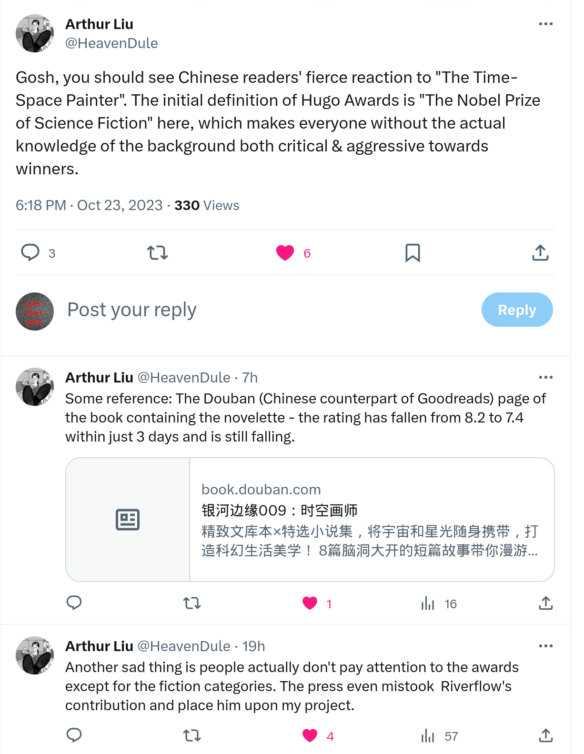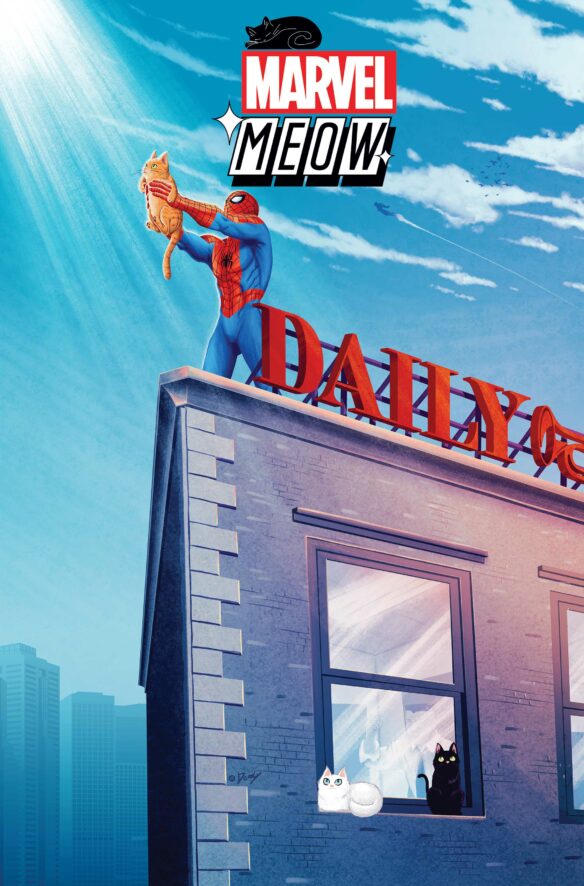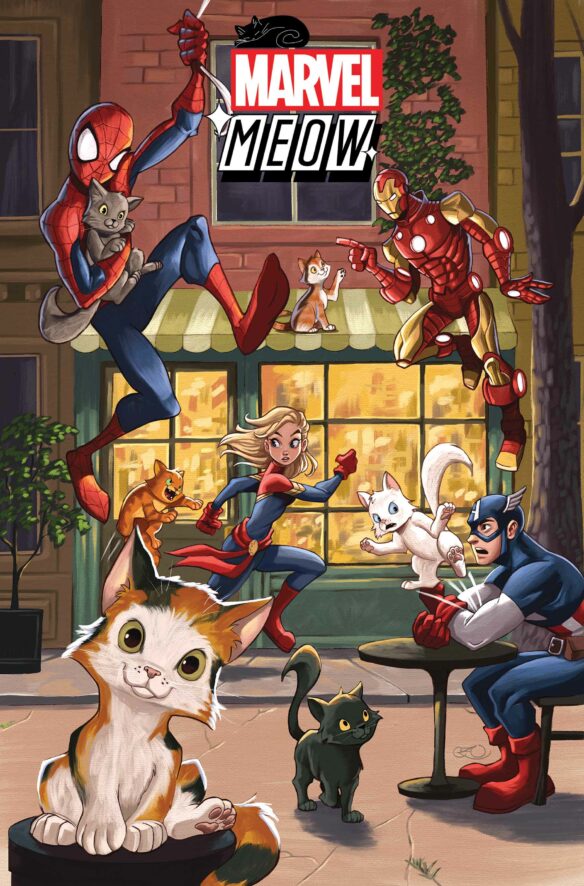(1) CHENGDU WORLDCON ROUNDUP. [Item by Ersatz Culture.]
Hugo winner RiverFlow’s con report
Some of the events in this length con report, with lots of photos, have been briefly covered in a prior Scroll, and comments, but this report is absolutely worth reading all the way through, for all the extreme highs and lows. Via Google Translate, with very slight edits:
But when the opening ceremony progressed to the interactive session between [Cixin] Liu and the fans, I felt that my breathing rate was significantly accelerated and became more and more difficult. My chest felt tight and painful, my airway was extremely stiff, I had waist pain and abdominal numbness, and I felt dizzy and wanted to sleep. I asked the person next to me, Lu Ban, if I could leave early.
Lu Ban communicated with the volunteers, and then helped me walk to the medical aid room. The doctor gave me oxygen, asked about my various conditions and conducted a preliminary examination. Two other volunteers also arrived. The doctor said that to be on the safe side, he suggested staying at the Pidu District People’s Hospital for one night for observation. As a result, I became the first patient hospitalized during this World Science Fiction Convention.
(Note: for some reason, machine translation often renders 河流 as Hehe rather than Heliu; the latter being the Chinese for RiverFlow. Also note that “Tianjue” is Hugo Fan Writer finalist Arthur Liu, who uses the online name HeavenDuke, an anglicization of 天爵/Tian Jue.)
Although it’s not clear from the page itself, he also posted the full text of his acceptance speech; per his con report, he was not able to read all of it out on stage.




Zhang Ran’s con report
I wasn’t aware of Zhang Ran, the author of this Chinese-language piece, but a search for “Taiko Science Fiction Academy” came up with this English language article which provides a fair bit of background. Some of the text (as processed through Google Translate) in his report on the Chengdu Worldcon raises eyebrows.
The Chengdu Science Museum, which cost more than 1 billion yuan ($137 million USD) and was designed by Zaha Hadid Architects, is a spectacle…
It was held in Asia for the second time since Nippon 2007 Worldcon in Yokohama in 2007. This should be a carnival for Chinese science fiction fans, but I couldn’t find any carnival look on the faces of many people attending the conference.
The volunteers were stiff and frightened, as if they were fulfilling some grand historical mission. The security check is dense and solemn, as if guarding some mysterious core…. The science fiction market, which should be reserved for ordinary fantasy fans, will naturally be run by companies that have little to do with science fiction.
It is commendable that this conference effectively compressed the time of leaders’ speeches to a length that foreign friends can understand. However, hundreds of primary school students walked in uniform steps at the conference venue, which was inevitably confusing….
Don’t get me wrong, I fully support China’s hosting of the World Science Fiction Conference, and I also understand that this conference has given Chengdu, Sichuan, and China a boost in Chinese science fiction.
But if, just if, the investment spent on the facade is shifted a little bit to the fans, so that they can reduce the walking distance, attend two more panels with the guests sitting next to them (rather than on the stage), and participate in one It is possible, just possible, to set up two stalls selling bookmarks and second-hand books during a parade and have lunch near the venue without having to fight for a seat. It would make the guests and hosts enjoy themselves more like a great country.
If I were a member of the organizing committee, I would definitely not invite myself to be a guest next time. It would be shameless for me to be a good person after getting an advantage.
But if I can attend a conference where everyone has smiles on their faces instead of solemn expressions, such as singing songs around a campfire, then I will definitely come at my own expense.
(Note: I put the text through DeepL and Vivaldi’s Lingvanex translation software, and got similar results, so I assume the above is reasonably accurate, whilst suffering a fair number of ungrammatical bits that I didn’t have time to clean up.)
Chinese reaction to one of their Hugo winners
Arthur Liu made some interesting observations in reply to a Hugo Book Club reposting of one of their old tweets (1), (2), (3).
I’ve not had time to uncover much of the negative discussion referred to – I suspect that it’s happening in WeChat/Weixin groups, which I don’t have access to. On Weibo, I did find this negative review and another brief comment, but both of those postdate Arthur’s tweets.
I suspect such discussion is also the reason behind SF Light Year reposting an earlier Weibo post of that Hugo Book Club tweet.
Hai Ya can hopefully console himself with being featured on a TV news report. The ballad playing in the background probably wasn’t part of the original broadcast.

An observation on the different preferences between Chinese authors and readers
In an English-language Mastodon post, author Taiyo Fujii reported a recent chat he had about the Chinese SF industry (slight edits for style and grammar):
At Tianfu airport, I met a young scholar who studies Asian SF history. I met her once before in Chengdu in 2019. At that time, I only gave her an autograph, but we had a good discussion around SF.
Her worry about Chinese SF is a conflict between hard and soft SF. Publishers say that readers love scientific hard SF, but young writers prefer to write more human related works.
I agreed, and gave some examples of workarounds.
And we discussed the theme of Ted Chiang, Gu Shi and Kim Choyop.
An attendee’s video of the con
The first minute or so of this Bilibili video is perhaps a little too Cixin Liu heavy, but then we get a good look at the fan table and dealers area. That section of the video has been sped-up, but Bilibili does have a button to let you change the playback speed to 0.5x or 0.75x, allowing you a better look at things.
(2) HARRY POTTER AND THE PARALYZED STUNT PERFORMER. [Item by Mike Kennedy.] One stuntman — stunt boy, really — subbed for Daniel Radcliffe through almost all of the Potter movies. Until, that is, a tragic accident on the set of the penultimate film left David Holmes paralyzed.
Now a documentary about Holmes is coming out. Radcliffe not only is interviewed during the film, but signed on as an executive producer. Variety has the story: “Daniel Radcliffe’s ‘Harry Potter’ Stunt Double Was Paralyzed After ‘Deathly Hallows’ Set Accident — Now They’ve Teamed Up for a Doc to Tell His Story”.
… The documentary features “candid personal footage shot over the last decade, behind-the-scenes material from Holmes’ stunt work, scenes of his current life and intimate interviews with David, Daniel Radcliffe, friends, family, and former crew,” HBO adds. “The film also reflects universal themes of living with adversity, growing up, forging identities in an uncertain world, and the bonds that bind us together and lift us up.”
“David Holmes: The Boy Who Lived,” directed by “Lad: A Yorkshire Story” filmmaker Dan Hartley, is just the latest collaboration between Radcliffe and Holmes following their work together across the “Harry Potter” movies. During the pandemic in 2020, the two joined forces to launch the “Cunning Stunts” podcast in which they shined a greater light on stunt performers across Hollywood.
“I think there’s a myth around stuntmen that they are just superhuman in some way,” Radcliffe said at the time about the podcast. “When the public see something really painful or horrible, they think it was a visual effect or that there’s some clever, safe way of doing it. Often that’s not the case. There’s no way of faking, for example, falling down stairs. When you get hit by a car, you’re still getting hit by a car, even if it’s going slower than it would. They find the safest way of doing it, but it can still hurt.”…
(3) PEN NAME PRO TIPS. The SFWA Safety Committee today posted “Safety Dispatch: How to Establish and Use a Pen Name” at the SFWA Blog.
Have you ever considered writing under a pen name? Some authors use pseudonyms to separate works under different genres, reboot their careers after a dry spell, or replace the names of multiple authors on the cover. These are all great reasons, but some authors want to use a different name for privacy or safety reasons, and that’s what we’ll cover here.
Maintaining anonymity in the digital age can be challenging. Most publishers expect authors to have some way to communicate with fans. This kind of interaction is even more critical for indie authors, who often rely on newsletters and hand-selling to move their books. It might seem daunting to separate your legal identity from your author-life, and a determined hacker can trace your pen name back to your legal name, but here are some best practices that can help safeguard your privacy….
(4) ALIENS BEFORE TV GOT HOLD OF THEM. BBC Futures introduces us to “The weird aliens of early science fiction”.
…Humanity’s ideas about aliens have been evolving for millennia – but in the era before television, they were considerably stranger….
…Generations before, the aliens of early science fiction were considerably more fantastical – bloodcurdling octopus-beings, intelligent swarms of insect-creatures and monstrous reptiles.
In 1887 – before the invention of sliced bread, ice lollies or even the word “teenager” – the science fiction author Joseph Henri Honoré Boex set pen to paper in his Brussels office and imagined up Les Xipéhuz.
The book is set on Earth, a thousand years before the ancient Mesopotamian cities of Nineveh and Babylon were founded, and begins with a dream-like encounter in a forest clearing. A nomadic tribe of people are looking for somewhere to rest one night, but instead they stumble upon “Les Xipéhuz”, translated as “The Shapes”.
The bizarre, geometric creatures resembled “bluish, transparent cones” with their point facing upwards. Each was around half the size of a human, with some stripey markings and “a dazzling star near its base like the sun at midday”. The creatures are considered among the first non-humanoid aliens in science fiction, within a cautionary tale that shows how devastating first contact can be with an unfamiliar “other”. After many battles, (spoiler alert), it becomes clear that there’s no room for diplomacy. Even the way the Shapes communicate, by tracing symbols on each other’s bodies using the rays of their stars, is alien. In the end, they are exterminated.
As it happens, the timing of this story is no accident….
(5) STINKER REX. There’s a meme going around poking fun at those who frequently think about the Roman empire. When this new Mary Beard book arrives they won’t be doing it any less! “A Very Bad Emperor Indeed: An Exclusive Guest Post from Mary Beard, Author of Emperor of Rome” at Barnes & Noble.
…Elagabalus was an extreme version — almost a caricature — of a very bad Roman emperor indeed.
But when I came to write my new book Emperor of Rome, I began to think about Elagabalus rather differently. It’s not that I decided he had been terribly maligned and was probably a decent kind of chap after all. But I did see that many of the stories told about him were more pointed than just random tales of capricious misbehaviour on the part of a teenaged emperor — he was about 18 years old when he was, predictably, assassinated in 222 CE.
True or not (and many, I suspect, were not), these flamboyant anecdotes often highlight the fears and suspicions that the Roman population had of their rulers….
(6) IN CASE YOU WONDERED. Victoria Strauss explains “Why Writer Beware Doesn’t Recommend or Endorse Agents or Publishers” at Writer Beware.
“You warn about so many bad literary agents and publishers, why don’t you ever tell us about the good ones?”
It’s a question Writer Beware has been getting for almost as long as we’ve been around, from writers bewildered about where to go for reliable information, frustrated by the abundance of author-focused schemes and scams, or just exhausted by the work of finding a good home for their manuscripts.
I have a standard answer that I provide when people email me with this question or ask me on social media. But with writing scams more prevalent than ever, and writers more beleaguered by fraudulent solicitations than at any time in Writer Beware’s history, I thought it would be helpful to offer a more detailed explanation of why we call out the bad guys but don’t focus on the good guys.
1. Writer Beware has a relatively narrow mission, and it’s all about fraud.
Our purpose is to track, expose, and raise awareness of the prevalence of fraud and other bad practice in and around the publishing industry, with the aim of providing writers with the information they need to protect themselves from exploitation. (More detail is here.)
In other words, we’re not an everything-about-publishing organization; we are laser-focused on just one aspect of the publishing world. We feel it’s better to do one thing intensively and well than to try and be all things to all people.
More practically, we are a small, all-volunteer group–we simply don’t have the staff to handle the time-consuming, careful research that would be needed to maintain and update a database of “good” agents and publishers and bring that information to the public. Instead, by identifying the characteristics of common schemes and scams and shining a light on their inner workings–by educating writers on what to avoid, in other words–we try to give them tools they can use to safely research agents, publishers, self-publishing platforms, etc. on their own.
(7) TODAY’S BIRTHDAYS.
[Compiled by Cat Eldridge.]
- Born October 24, 1915 — Bob Kane. Writer and Artist who co-created, along with Bill Finger, the DC character Batman. Multiple sources report that “Kane said his influences for the character included actor Douglas Fairbanks’ movie portrayal of the swashbuckler Zorro, Leonardo da Vinci’s diagram of the ornithopter, a flying machine with huge bat-like wings; and the 1930 film The Bat Whispers, based on Mary Roberts Rinehart’s mystery novel The Circular Staircase.” He was inducted into Jack Kirby Hall of Fame and the Will Eisner Hall of Fame. The character he created has been featured in countless comic books, stories, movies, TV series, animated features, videogames, and action figures in the last eight decades. The 1989 movie based on his creation, featuring Michael Keaton in the title role, was a finalist for both Hugo and British Science Fiction Association Awards. (Died 1998.) (J)
- Born October 24, 1948 — Margaret “Peggy” Ranson. Artist, Illustrator, and fan, who became involved with fandom when she co-edited the program book for the 1988 Worldcon in New Orleans. She went on to provide art for many fanzines and conventions, and was a finalist for the Best Fan Artist Hugo every one of the eight years from 1991 to 1998, winning once. She was Guest of Honor at several conventions, including a DeepSouthCon. Sadly, she died of cancer in 2016; Mike Glyer’s lovely tribute to her can be read here. (Died 2016.)
- Born October 24, 1952 — Jane Fancher, 71. In the early 80s, she was an art assistant on Elfquest, providing inking assistance on the black-and-white comics and coloring of the original graphic novel reprints. She adapted portions of C.J. Cherryh’s first Morgaine novel into a black-and-white comic book, which prompted her to begin writing novels herself. Her first novel, Groundties, was a finalist for the Compton Crook Award, and she has been Guest of Honor and Toastmaster at several conventions.
- Born October 24, 1952 — David Weber, 71. Best known for the Honor Harrington series, known as the Honorverse. He has three other series (Dahak, War God and Safehold), none of which I’m familiar with. The Dragon Awards have treated him well giving him three Best Military Science Fiction or Fantasy Novels for Hell’s Foundations Quiver, A Call to Vengeance and Uncompromising Honor. His only other Award is a Hal Clement Young Adult Award for A Beautiful Friendship.
- Born October 24, 1954 — Wendy Neuss, 69. Emmy-nominated Producer. As an associate producer for Star Trek: The Next Generation, her responsibilities included post-production sound, including music and effects spots, scoring sessions and sound mixes, insertion of location footage, and re-recording of dialogue (which is usually done when lines are muffed or the audio recording was subpar). She was also the producer of Star Trek: Voyager. With her husband at the time, Patrick Stewart, she was executive producer of three movies in which he starred, including a version of A Christmas Carol which JJ says is absolutely fantastic, and a rather excellent if stylistically different The Lion in Winter too.
- Born October 24, 1955 — Jack Skillingstead, 68. Husband of Nancy Kress, he’s had three excellent novels (Harbinger, Life on the Preservation and The Chaos Function) in just a decade. I’ve not read the third one yet but I’ve no reason not to assume that it’s not as good as his first two works. He’s due for another story collections as his only one, Are You There and Other Stories, is a decade old. All of his works are available at the usual suspects for quite reasonable rates.
- Born October 24, 1956 — Dr. Jordin Kare. Physicist, Filker, and Fan who was known for his scientific research on laser propulsion. A graduate of MIT and Berkeley, he said that he chose MIT because of the hero in Heinlein’s Have Spacesuit, Will Travel. He was a regular attendee and science and filk program participant at conventions from 1975 until his untimely death. He met his wife, Mary Kay Kare, at the 1981 Worldcon. He should be remembered and honored as being an editor of The Westerfilk Collection: Songs of Fantasy and Science Fiction, a crucial filksong collection, and later as a partner in Off Centaur Publications, the very first commercial publisher specializing in filk songbooks and recordings. Shortly after the shuttle Columbia tragedy, astronaut Buzz Aldrin, on live TV, attempted to read the lyrics to Jordin’s Pegasus Award-winning song “Fire in the Sky”, which celebrates manned space exploration. He was Guest of Honor at numerous conventions, and was named to the Filk Hall of Fame. Mike Glyer’s tribute to him can be read here. (Died 2017.) (JJ)
- Born October 24, 1972 — Sofia Samatar, 52. Teacher, Writer, and Poet who speaks several languages and started out as a language instructor, a job which took her to Egypt for nine years. She won the Astounding Award for Best New Writer, and is the author of two wonderful novels to date, both of which I highly recommend: Stranger in Olondria (which won World Fantasy and British Fantasy Awards and was nominated for a Nebula) and The Winged Histories. Her short story “Selkie Stories are for Losers” was nominated for the Hugo, Nebula, BSFA, and BFA Awards. She has written enough short fiction in just six years that Small Beer Press put out Tender, a collection which is an amazing twenty-six stories strong. And she has a most splendid website. (Standback)
(8) STRONG OATHS. After reading this installment of Hagar The Horrible Daniel Dern asks, “Is this Mandarin grawlix?”
Grawlix is the term for symbols denoting swearing in comic strips.
(9) SUPERCREDENTIALS. In January,“’Marvel Meow’ Makes Its Print Comic Debut!”.
The cats of the Marvel mythos will claw their way to comic shops this January! Marvel Meow #1 collects Nao Fuji’s hit Marvel Unlimited Infinity Comic and features brand-new covers and an exclusive new Marvel Meow story. The series spotlights adorable interactions between the cats of the Marvel Universe and your favorite heroes and villains. These delightful adventures are perfect for all ages and are sure to delight Marvel fans, cat lovers, and everyone in between!
Marvel’s most fearsome – and furriest – heroes are here to save the day and beg for treats in the process! Follow Chewie, Liho, Alpine and the rest of the Avengers’ feline friends as they cause a few cat-tastrophes…and maybe vanquish some villains in the process! Whether it’s crashing Captain Marvel’s apartment or defeating Doc Ock, you can always count on these cats for some cute chaos!



(10) LOTR LAGNIAPPE. GameRant calls these “The Best Lord of the Rings Books That Aren’t The Tolkien Series”.
Whether you’re a crafty, good in the kitchen, or just a major nerd for Middle-earth history, there’s a LOTR-adjacent book out there that you’re sure to fall in love with. These books are ranked as the best you can get for their attention to canon and lore and the value they offer for those LOTR lovers who are looking to either expand their knowledge or celebrate Tolkien’s magical world….
For example:
The Unofficial Lord of the Rings Cookbook
If you’re handier in the kitchen, this LOTR cookbook that includes over 60 recipes inspired by Tolkien’s stories will be perfect for you! The recipes come with stunning full-color photographs so you can have a good idea of what you’re making, with Middle-earth recipes ranging from Lembas Bread to Sam’s Coney Stew.

(11) SFF SPECIAL EFFECTS HUB CELEBRATED. The Gunnersbury Park and Museum in the UK is hosting the “Set to Stun: Designing & Filming Sci-Fi in West London” exhibit through June 2, 2024.

Beyond the stars and behind the scenes… for nearly a century west London has been home to a hive of workshops and design studios that fed into some of the country’s most iconic Sci-Fi films and TV shows.
Our major new exhibition ‘Set to Stun’ will celebrate sci-fi film and television from the 1960s through to today, turning the camera onto the west London artisans, artists and crafts people who brought it all to life.
From laser beams to paranoid androids, exploring faraway planets to alien invasions – visitors will get to enjoy an engaging and interactive showcase of the sets, costumes, prosthetics, props, and artistic visualisations that went into British Sci-Fi classics, including Doctor Who, the Hitchhiker’s Guide to the Galaxy and Red Dwarf. We’ll also bring the story up to date with a motion capture interactive.
The exhibition will encompass informative and engaging content for enthusiasts and fun and fascination for families, with workshops for both adults and kids.
(12) WEIRD FICTION EXPLAINED. [Item by SF Concatenation’s Jonathan Cowie.] Moid over at Media Death Cult has a stab at explaining weird fiction in under 13 minutes. Unlucky for some, weird or what?
[Thanks to Andrew Porter, Ersatz Culture, John King Tarpinian, Daniel Dern, Chris Barkley, Cat Eldridge, SF Concatenation’s Jonathan Cowie, and Mike Kennedy for some of these stories. Title credit belongs to File 770 contributing editor of the day Daniel Dern.]
Discover more from File 770
Subscribe to get the latest posts to your email.

First!
I’m half way through Gareth Powell’s Descendant Machine and I can say it’s one of the best SF listens that I’ve had this year. It’s the second novel in what I assume will be at least a trilogy.
And the streak ends…..
Patrick Stewart’s version of “A Christmas Carol” is indeed a very good movie. And his version of “.The Lion In Winter” is quite good as well with Glenn Close as Elinore of Aquataine matching him quip for quip.
(7) Tomorrow I’ll look for Aldrin’s recitation of Kare on YouTube (if it’s there).
(1) The one link I followed, to weibo, even after I told noScript to allow the page, left me with a blank window.
(5) Could someone explain where this “thing” about “men thinking about the Roman Empire” came from (other than maybe the coming fall of the US empire)? On the rare occasion I think of the Roman Empire, mostly it’s “how did the Legions conquer the world without a hot shower in the morning?”
(6) Good for her. Too many people try to cover too much. I had a course in college on writing, and it was really, really hard to start with a Theme, then start cutting until you had something you could write a paper on before the course ended, not something that would occupy you for the rest of your life. (Of course I picked something from the Matter of Britain….)
Birthdays: Miss Jordan, damn it. Wish I’d known him better.
Sunday night I came down with a sore throat, and while the home Covid test came up negative, it’s had me mostly flat on my back ever since, so I’ve cancelled my arrangements to go to MileHiCon this weekend. It’s particularly annoying since I got a flu shot and a Covid booster in September, with this very trip in mind. Be careful out there.
@mark
I just re-checked all 3 Weibo links in a Firefox window that didn’t have any existing cookies or suchlike that might affect what gets displayed. All three posts did display, although one of them took a few seconds, when it did something I’ve occasionally seen, where it seems to think about redirecting you to a login page, but then decides to show you the post after all.
I’ve found that Weibo does seem to nag you more about logging in if you visit a page on a mobile device, rather than a PC browser.
Dealing with inconsistent UI behaviours and other weirdnesses is one of the joys of working with many Chinese websites; there definitely seems to be an attitude that the majority of users are using mobile devices (probably an app rather than a browser), and are logged in users, rather than just casual visitors.
(1) “[Taiyo Fujii’s] worry about Chinese SF is a conflict between hard and soft SF. Publishers say that readers love scientific hard SF, but young writers prefer to write more human related works.”
Could that be because the Chinese government would rather have fans exposed to “scientific hard” SF, and it discourages publishers from producing the “human related works” that young writers prefer? More socially-oriented SF is certainly a trend that took hold in Western SF several decades ago. We can’t know what readers would prefer unless and until they are provided with the choice.
(4) My guess is that TV, especially, and also movies, have relied on humanoid aliens is that they are cheaper and easier to create, along with a certain lack of imagination.
I’m looking for mysteries set on the Orient Express aside from the Agatha Christie and Graham Greene novels which of course are excellent, so suggestions please.
Jordin’s death was such shock, and I don’t think Mary Kay ever recovered from it. I miss them both.
(1) So “Arthur Liu, who uses the online name HeavenDuke” is a typo for “Heavendule”, as shown below?
@Jan Vanek jr.: From what he told me, HeavenDuke is his preferred online handle, even on Chinese sites (although he usually gets referred to by everyone else with the “tian”+”jue” characters). However, when he came to create a Twitter account, someone else had already grabbed that account name, so he used @HeavenDule as a fallback option.
Funny story: he uses the name “Yang Feng” for his fiction published in Chinese. (When translated to English in places like Clarkesworld and The Big Book of Cyberpunk, it is credited to Arthur Liu.) As the person who volunteered themselves to get all the details about the Chinese Hugo finalists into ISFDB, it confused the hell out of me why there seemed to be another Hugo finalist called Yang Feng, who was a completely different person.
Being pretty introverted by nature, I was reluctant to reach out, but then I saw a post in a Hugo nomination announcement thread on Reddit by Arthur Liu. He didn’t identify himself as a finalist, but I realized it was him, and felt brave enough to send him a private message, where he explained about all the names he uses.
Without that confusion over pen names, I probably never have reached out to him, which in turn wouldn’t have lead to contact with SF Light Year/Adaoli and RiverFlow, and in turn would have meant that there wouldn’t have been much, if any Chengdu Worldcon coverage on here, at least not from me.
There’s also a funny-but-not-funny-haha story relating to the very first item in this Scroll, and some of the photos in a Scroll from last week, but I’ll talk about that another time.
Perhaps. I rather put it down to an evolution going on in the writers craft. It’s not like the luminaries of 50s Anglophone SF were especially interested in characterisation either. (Yes, Sir Arthur, I’m talking about you.) I’ve read a fair bit of diaspora writing that’s heavy on what happens but not on what people think about it. Not everything is always driving by a CCP mandate.
I dunno. I’m sort of with the reported Chinese readers on this one. The “young writers,” many of them perhaps not really sf people at all, but just aspiring writers latching onto a popular genre, may be too ignorant of science to do real sf, or may have an arguably praiseworthy but artistically unsatisfying desire just to write masked antiregime works. I gather a lot of now forgotten East German sf was like that, as certainly was some Soviet sf, and arguably even a lot of Lem’s work in Polish. Or, less politically, look at all the bad-science garbage that appeared in the lower-tier American pulps in the early 1950s as the sf market expanded and attracted new writers or ones switching genres.
There have been quite a few stunt men and women who were seriously injured. Here are just a couple of examples:
In one of the Pirates of the Caribbean movies, a stuntman was to drop from a height with a rope attached to his leg. He ended up being snapped like a wishbone and disabled.
One of the stunt men for the Errol Flynn film, “The Adventures of Robin Hood,” was to jump down from a short rope to the ground (the escape from the castle scene), and broke both ankles.
It’s inherently dangerous work, even with precautions. Invariably, there are injures that sideline them, injuries that require surgery, and sometimes, deaths.
I’ve known a few that quit the industry to avoid getting further injuries. It takes a toll later in their lives as far as mobility.
CGI is taking some of the really hazardous stuff out films, but it is also costing some stunt workers their livelihoods (along with makeup men, and extra workers).
I can understand the Chinese volunteers being stressed out; considering the direction the current Chinese government is going in, this is the sort of event that your participation in might damn you later.
Pingback: Some Comments on the 2023 Hugo Winners | Cora Buhlert
I was looking for something else entirely when I found some good advice from Kevin Standlee posted to a Usenet newsgroup in 1996:
He was parliamentary when parliamentary wasn’t cool!
@Shrike58 The pre-con take on things by some people here was that Worldcon was being directly controlled by the Chinese government for some nefarious purposes of their own, kind of interesting to see the opposite version.
He was Scrolling Pixels when Scrolling Pixels wasn’t cool.
Birthdays: Jane Fancher also co-authored two recent books with her spouse, C.J. Cherryh: Alliance Rising, and the just-released (Oct. 17) Defiance. A sequel to the former is scheduled for release next year.
@Thomas the Red: just as second-fifth is better than first-fifth, second-first may be better than first-first.
@8: “Grawlix is the term for…”
This is a minor pet peeve of mine, or at least something I feel like clarifying pedantically when it comes up: “grawlix” and other funny coinages attributed to Mort Walker* are much more commonly used by people not in the comics field, in statements like “Did you know there’s a term for those swearing symbols we all know from comics? It turns out cartoonists call them ‘grawlixes’!” In hanging out with cartoonists for the last few decades, and going to grad school for comics, I’ve virtually never heard anyone use those words except as a joke—with the exception of “emanata”, although that one has come to be used more loosely to refer to all sorts of symbols being emitted by a character, including for instance sweat beads (which Walker called “plewds”, but every cartoonist I’ve ever met calls “sweat beads”). There just isn’t a huge need for terms of art for these items because there aren’t that many occasions for people to talk about them— a scriptwriter will just write #*@$! directly in a line of dialogue rather than putting “[grawlix]”, or say a character looks shocked rather than say there are emanata around his head. Walker’s book was written with mostly humorous intent— a joke on the assumption that every field must have tons of very specialized jargon, when in reality cartoonists had had no problem using these conventions for half a century without needing a special vocabulary for them.
[* Walker is always cited for these, but he got at least some of them from a piece by Charlie Rice.]
@mark: Could someone explain where this “thing” about “men thinking about the Roman Empire” came from
It was a social media fad that started with an Instagram post and then took off on TikTok. The premise was that a woman would ask a man how often he thought about the Roman Empire, and surprise surprise, it turned out to be some massive amount of the time. How many of these responses were factual and how many were the kind of thing people say when they’re goofing around on TikTok… is a question that reporters writing about this fad managed to almost entirely avoid, churning out tons of articles with headlines like “The psychology behind some men’s obsession with the Roman Empire, according to these brain experts“, all of which acknowledge in about half a sentence that it’s probably largely bullshit but then go on and on and on to tell us WHAT IT ALL MEANS.
(1) Glad RiverFlow got such prompt care from volunteers and medical personnel and is OK now.
What’s the Hugo base representing?
Zhang Ran’s article matches up with the impression I got online. It looked like not nearly enough fun. Chinese people are capable of BIG fun, but this wasn’t it.
Sad to find Arthur’s plea falling on deaf ears. Considering the haters all dis “Folding Bejing” (which I voted for or at least nominated), I’m now interested in reading a good translation of “The Time-Space Painter”.
(2) Radcliffe seems like a good ‘un.
Stunt people have died. I was once on a set where everyone could hear that the stunt had gone wrong — it was a simple “car jumps over other car via ramp” and that landing crunch was felt in the pit of everyone’s stomach. Especially as we’d all seen him kiss his wife and kid before starting. Turned out he “only” got a concussion. And this was on a very professional/well-funded project, with all sorts of straps for him. But long before CGI.
(4) Because books have unlimited budgets for special effects, like @Janice said. Also, never forget Jim Mc/MacDonald’s step by step debunkery of the Hill case!
(5) I’m not sure why the whole “dudes always think about the Roman Empire” meme is. Mr. LT can go weeks without it (or the Republic), whereas I’m the one with all the books including Latin textbooks and was mumbling throughout “Gladiator”… “stirrups, ugh; ooh, ‘the awnings will be used!” He introduced me to one of his old girlfriends and ended up sitting in a corner while she and I enthusiastically discussed it. I even used to be in a (Republic) MUSH, and Cora and I had a discussion about while we appreciated Tom Hiddleston having correct grammar in “Loki” season 1, we were mildly peeved by his English accent. (US/German pronunciation of Classical Latin is different). Plus, of course the estimable Mary Beard, whose books I buy in hardback. My BFF and her husband also show a great difference.
7) I watched the Batman movie (West and Ward) recently. Kinda slow-paced by today’s standards.
I miss Jordin and Mary Kay a lot. Still fondly remember that party where he used his JPL access to show us the pictures coming from Mars.
@Eli: The article says “grawlix” is a term used for, not that cartoonists use it.
@Lurkertype–
And they say Latin is a dead language!
@Lis: Not among some of your friends!
(skritch doggo for me)
@Lis Carey:
That is not dead which can eternal lie
And with strange aeons even death may die.
@Lurkertype–Just the fact that it’s possible to get superior about different accents means it’s not a dead language. And it’s no surprise that some of my friends are among those making it not-dead!
Cider sends greetings. She says if you come give her bits of chicken or cheese, she will give you a very pretty sit for each one, take them very gently, and allow you the honor of scritching her yourself. In the meantime, I will give her some scritches from you.
I think the usual standard for declaring a language dead is whether there are any native speakers. Without native speakers, a language is unlikely to grow and evolve; it’s frozen and static. But, yeah, there’s dead, and then there’s dead dead, and Latin’s definitely not dead-dead. I wouldn’t even call it a zombie language–more like an elegant and stylish vampire! 🙂
John S / ErsatzCulture: Oh, thank you very much for both this explanation, and of course especially for your Chengdu coverage lately! My apologies for being so dumb here (and belated, I’ve been travelling and forgetful).
Lis Carey / Lurkertype: That’s the point with dead languages. As far as now (and I am not an expert), even the Continental pronunciations of Latin have at least two, if not three distinct forms, each with some historical justification. (In fact, I could expound onhow “sci-fi” is pronounced over here, not to mention “cyberpunk”…)
@Xtifer: The Vatican invents new words now and then as technology progresses. And auto-translate does Latin.
@Lis: Bother. The credential ate breakfast early, so now wants dinner even earlier. He will take chicken and cheese with no manners at all, using some pointy bits. But also skritches.
@Jan: TBF, I suspect the original version had different pronunciation, else we wouldn’t have Romance languages. I think the American version is based on the German one, for 19th century reasons.
@Xtifer–Differing pronunciations are a feature of living languages.
As Lurkertype says, it’s how we got the romance languages. It’s why we have German and Dutch. Heck, it’s why we have German, Dutch, and English. More currently, listen to British, American, Australian, and Indian English.
Roman Empire – oh, I see, from tiktok. No wonder I don’t know about it. I expect next there’ll be some stupid “challenge” that involves risking yourself to be like Rome.
And “how sci-fi” is pronounced? You mean skiffy (rhymes with the US commercial peanut butter)?
mark: “Sci-Fi” rhymes with “hi-fi”. (But if you pronounce that hiffy, never mind.)
Pingback: Pixel Scroll 10/26/23 It Was An Early Evening Pixel And The Scroll Had Just Opened Up - File 770
Pingback: Pixel Scroll 10/28/23 When You Saw Only One Set Of Pixels, It Was Then That I Scrolled You - File 770
(Late but better than never, I suppose:) Yup, in Czech “hi-fi” is of course hiffy (because people knew it primarily from writing, and that’s what you do with I anyway; we’ve had vowel shifts too but way, way different). So sci-fi rhymes with that, but the opening consonants are again what we do with them normally including in “scientia”, with a distinct “s’ts”.
Lurkertype: I may have gotten in over my head, but I would have thought that the American Latin is like the English one, for obvious historical reasons 🙂 At which we Continentals laugh, of course. The internal point of contention is pretty much congruent with how far you want to go in the reconstruction — I recall (but am unable to reproduce) a derisive rhyme about Kikero and Kaiser…
Pingback: Pixel Scroll 11/4/23 Pixels Of The Night, From Pixelated Pixelvania - File 770